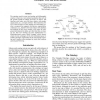Free Online Productivity Tools
i2Speak
i2Symbol
i2OCR
iTex2Img
iWeb2Print
iWeb2Shot
i2Type
iPdf2Split
iPdf2Merge
i2Bopomofo
i2Arabic
i2Style
i2Image
i2PDF
iLatex2Rtf
Sci2ools
AAAI
2000
2000
Untangle: A New Ontology for Card Catalog Systems
The ontology used by most card catalog and bibliographic systems is based on a now outdated assumption that users of the systems would be looking for books on shelves, and therefore only books were first-class objects, with people, organizations, etc. as simple attributes. This limited the ability of a user to browse. A new ontology for card catalog systems is proposed that suggests that persons, organizations, conferences, etc., should be first-class objects with attributes and relations of their own, creating a rich space of background information that helps users find what they are looking for. This new ontology has been implemented in a knowledge-based system called Untangle, which demonstrates two key advantages of this rich information space: it enables automatic augmentation of the data through reasoning, and it enables a new paradigm for search that combines querying and browsing.
| Added | 01 Nov 2010 |
| Updated | 01 Nov 2010 |
| Type | Conference |
| Year | 2000 |
| Where | AAAI |
| Authors | Christopher A. Welty, Jessica Jenkins |
Comments (0)

